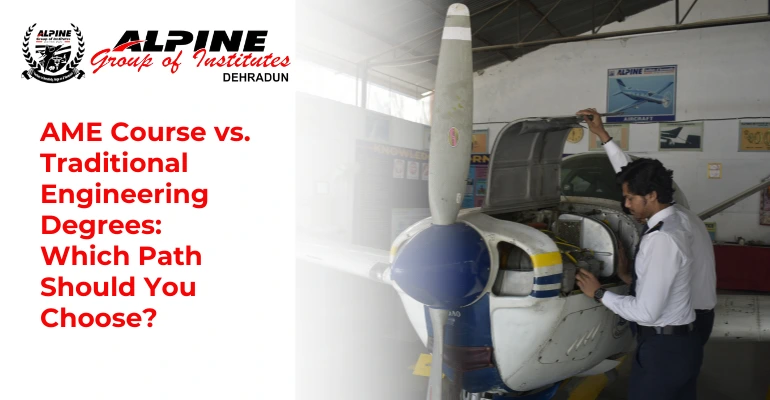AME Course vs. Traditional Engineering Degrees: Which Path Should You Choose?
2024-12-18 8:35AME Course vs. Traditional Engineering Degrees: Which Path Should You Choose?

AME Course vs. Traditional Engineering Degrees: Which Path Should You Choose?
Choosing a career path in engineering can be a difficult decision, especially with the wide range of options available. Among these, the Aircraft Maintenance Engineering (AME) course stands out as a specialized option with a unique set of opportunities. But how does it compare to traditional engineering degrees like Mechanical, Civil, or Electrical Engineering? opportunities, career growth, and skill sets.
1. What Is an AME Course?
An Aircraft Maintenance Engineering (AME) course focuses on training individuals to maintain and repair aircraft. This includes everything from inspecting airframes, engines, and avionics systems to ensuring that aircraft meet safety and regulatory standards. The course usually covers both theoretical knowledge and practical training, with an emphasis on aircraft systems, materials, and maintenance practices.
2. What Is a Traditional Engineering Degree?
A Traditional Engineering Degree (Mechanical, Civil, Electrical, etc.) covers a broad field of engineering principles and theories. These degrees provide students with a strong foundation in mathematics, physics, and problem-solving skills, allowing them to specialize in areas such as construction, electronics, or machinery. Unlike the AME course, these degrees are more generalized and can apply to various industries, from infrastructure to manufacturing and power generation.
3. Core Focus and Curriculum
- AME Course: The AME curriculum is highly specialized and hands-on. Students learn to work directly with aircraft, engines, and avionics systems. The course includes practical work in hangars, workshops, and laboratories, alongside theoretical lessons in aircraft systems, materials science, and aviation safety. It is geared toward those who are passionate about aviation and interested in maintaining aircraft.
- Traditional Engineering Degrees: These programs cover a wider range of topics depending on the discipline. For instance, a Mechanical Engineering degree will include subjects like thermodynamics, materials science, fluid mechanics, and dynamics. The curriculum is less specialized than the AME course, giving students a broad knowledge base that can be applied to a variety of industries such as automotive, civil construction, energy, and more.
4. Job Opportunities and Career Growth
- AME Course: Completing an AME course opens doors to a specific but highly rewarding career in the aviation industry. AMEs are in demand globally, and their work ensures the safety and reliability of aircraft. After completing the course and obtaining relevant licenses (like EASA, FAA, or DGCA certification), AMEs can work in commercial airlines, private aviation, defense, or even at aviation repair stations. The demand for skilled AMEs is expected to grow with the increase in air travel worldwide, offering stable and potentially high-paying job prospects.
- Traditional Engineering Degrees: The job opportunities for traditional engineering graduates are vast and varied. Graduates can work in a range of industries such as construction, telecommunications, automotive, energy, and manufacturing. The potential for career growth is significant, and many engineers eventually move into management roles or become experts in niche fields (e.g., robotics, renewable energy). However, the competition for jobs can be fierce, especially in saturated markets, and it may take longer to reach senior positions compared to the more specialized AME field.
5. Salary and Job Stability
- AME Course: Aircraft Maintenance Engineers tend to earn competitive salaries, especially in the aviation industry, where job stability is high due to the essential nature of their work. However, salaries can vary based on location, experience, and the type of employer. Senior AMEs, especially those working for large airlines or in specialized sectors, can command substantial salaries. Additionally, the increasing number of flights and the complexity of modern aircraft offer great job stability.
- Traditional Engineering Degrees: The salary potential for engineers depends on the specific branch of engineering and the industry they work in. For example, Mechanical Engineers may earn higher salaries in industries like oil and gas or automotive, while Electrical Engineers might have lucrative opportunities in tech or electronics. Traditional engineering roles also offer good job stability, though job prospects may fluctuate depending on economic cycles or industry trends.
6. Skill Set and Specialization
- AME Course: The skills gained from an AME course are highly specialized, focusing on aviation technology, safety standards, mechanical and electrical systems in aircraft, and troubleshooting techniques. An AME is trained to ensure aircraft are airworthy, meaning the skill set is specific and practical, designed for the aviation sector. There is a high degree of precision and attention to detail involved in this role, which requires a strong understanding of safety protocols and regulatory compliance.
- Traditional Engineering Degrees: Traditional engineering degrees provide students with a broad set of skills applicable across various industries. Engineers are trained in core concepts like design, testing, analysis, and problem-solving. While there is some specialization in areas like structural design, circuits, or manufacturing, it is much more flexible, allowing graduates to pivot into different sectors and roles over the course of their careers.
7. Work Environment
- AME Course: Aircraft Maintenance Engineers typically work in hangars, repair stations, or airport facilities, where they deal directly with aircraft. The job involves a mix of physical work and technical problem-solving in a controlled but often time-sensitive environment. It’s ideal for those who enjoy hands-on work and are passionate about aviation.
- Traditional Engineering Degrees: Engineers in traditional fields might work in offices, laboratories, factories, or construction sites depending on their specialization. While some roles may involve hands-on tasks (e.g., civil engineers working on-site or mechanical engineers working in factories), many positions focus on design, testing, and analysis from a desk or laboratory.
8. Which Path Should You Choose?
The decision between an AME course and a traditional engineering degree largely depends on your interests, long-term career goals, and the type of work you enjoy.
- Choose AME if:
- You have a passion for aviation and want to work directly with aircraft.
- You prefer hands-on, technical, and specialized work.
- You are looking for a career that offers global mobility and job security in the aviation industry.
- You want a shorter, more focused training period that leads directly to certification.
- Choose a Traditional Engineering Degree if:
- You prefer a broader approach and want flexibility in terms of industries and roles.
- You enjoy problem-solving and designing systems, machinery, or infrastructure.
- You want the potential to move into diverse sectors (e.g., automotive, energy, construction).
- You are interested in a career that offers a variety of specialization options over time.
Conclusion
Both paths AME courses and traditional engineering degrees — offer distinct career advantages, but they cater to different sets of interests and skills. The AME course is perfect for those passionate about aircraft and aviation, while traditional engineering degrees offer flexibility and opportunities in a wide range of industries. Whether you’re focused on the sky or the ground, your choice will ultimately depend on where you see yourself in the future and what kind of engineering challenges excite you the most.








